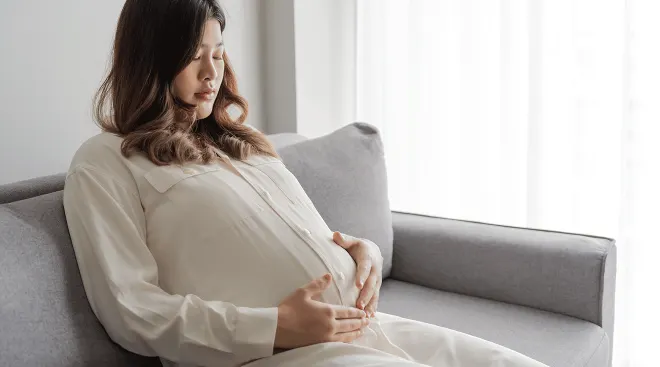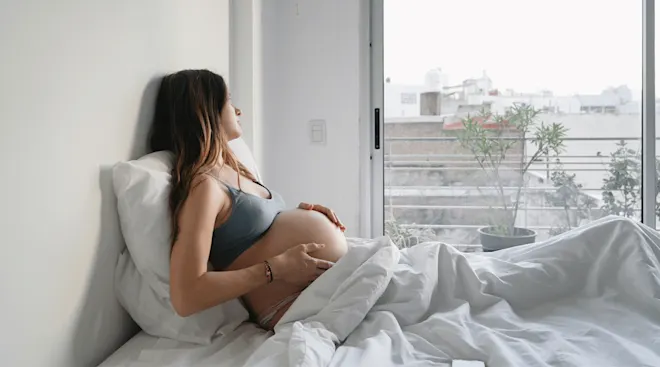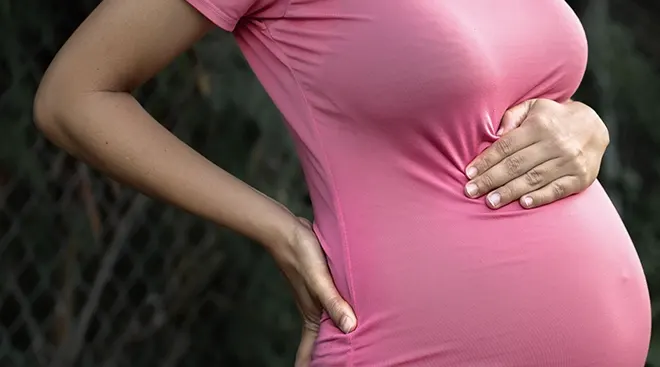How to Get Relief From Rib Pain During Pregnancy
Watching your belly grow is one of the most exciting things about pregnancy. But as your bump gets bigger, you may notice you’re dealing with some new aches and pains. Rib pain during pregnancy is one of the more common complaints among moms-to-be.
While you can’t magically cure rib pain during pregnancy, there are some things you can do to to get relief. Ready to get some pain-reducing tips from experts? Read on to learn what causes this discomfort, what you can do to lessen it and how to sleep with rib pain during pregnancy—plus, when to flag this with your provider.
Unfortunately, yes, it’s normal to experience rib pain during pregnancy. “It can be very common,” says Christine Greves, MD, an ob-gyn at the Winnie Palmer Hospital for Women and Babies in Orlando, Florida.
Of course, that doesn’t mean you should be walking around in agony. Rather, you may feel twinges and aches as you go about your day, or when you lay down to sleep at night. “Some rib pain is normal during pregnancy,” says Linda Cassar, DNP, a labor and delivery nurse and associate professor at George Washington University.
There are a few potential things that could be causing your rib pain during pregnancy.
Your uterus is expanding
“As the uterus grows and moves from the pelvis into the abdomen, it puts pressure on the diaphragm,” explains Cassar. “The resulting decrease in the capacity of the thoracic cavity can cause some discomfort in this area, which is where the ribs are located.”
Baby is pushing on your ribs
Baby’s position as your uterus grows can put them closer to your ribs. This can cause pressure, making you feel uncomfortable. Sometimes, baby will even kick your ribs.
Your hormones are changing
You’re probably well aware that you’re going through some hormonal shifts, and that includes an increase in the hormone relaxin. In case you’re not familiar with it, relaxin causes your muscles, joints and ligaments to—as the name implies—relax. “Hormonal changes result in loosening of the joints and ligaments, so that can lead to discomfort as well,” Greves says.
Your breasts are expanding
It’s common for the breasts to expand and grow during pregnancy. “Sometimes when the breast expands, it puts pressure on the ribs,” says Patricia A. Evans, NP, lead certified nurse midwife at MemorialCare Orange Coast Medical Center in Fountain Valley, California says.
There are a few things you can do to get relief from rib pain during pregnancy.
Focus on your posture. This can be a big help, according to Evans. “We tend to slouch more, especially as we’re sitting,” she says. “If you straighten your spine more, it’ll relieve that pressure.”
Use a maternity belt. A maternity belt or band, which lifts and supports your bump, may help to reposition baby and ease some of the pain, Evans says.
Try a more supportive bra. If you suspect that your breasts are contributing to rib pain, Evans recommends investing in a good maternity bra. “That can pull the breast off of the rib a little more,” she says.
Use warm and cold compresses. If it feels like your rib area is swollen, Evans recommends using a cold compress on the area. But if it just feels tender, she says that a warm compress may feel better. (A warm bath may also help.)
Do gentle stretches. This can help you to find more comfortable positions, Greves says.
It may take some trial and error to find the most comfortable sleeping position for rib pain in pregnancy. “When laying down, sometimes it’ll relieve the pain to lay to one side or the other,” Cassar says.
You may want to try resting on the side where you have pain, with a pillow underneath your uterus to lift it up and support the area, Evans suggests. (If you lay on the opposite side of where you have rib pain, the weight of your belly may pull on the area and hurt your ribs even more.)
You could also try sleeping in a recliner, if you have one. You may find the angled position feels better. “Flatter sleeping positions can sometimes be uncomfortable, especially later in pregnancy when the uterus is larger and causes more disruption to the organs in the abdominal and chest cavities,” Cassar says.
It’s a good idea to flag any rib pain you’re dealing with during your next prenatal visit. But it’s important to check in with your provider even sooner if it’s constant and/or affecting your quality of life, Greves says.
You’ll also want to call if you have a burning, heartburn-style pain or discomfort under the right side of your ribs. “This can be a sign of worsening preeclampsia,” Cassar says. And, if you happen to feel sudden shortness of breath, along with intense rib pain, you’ll want to seek immediate care. “This can be a sign of a pulmonary embolism, or a clot in the lungs,” Cassar adds.
If you’re having rib pain here and there, but it feels mostly manageable, just know that it’ll likely get better soon. “In the last few weeks of pregnancy, [baby] will drop into the pelvis in preparation for birth,” Cassar says. “When this happens, a lot of the pressure that was previously felt in the upper abdomen will be relieved.”
Please note: The Bump and the materials and information it contains are not intended to, and do not constitute, medical or other health advice or diagnosis and should not be used as such. You should always consult with a qualified physician or health professional about your specific circumstances.
Plus, more from The Bump:
Linda Cassar, DNP, is a labor and delivery nurse and an associate professor at George Washington University in DC.
Patricia A. Evans, CNM, is lead certified nurse midwife at MemorialCare Orange Coast Medical Center in Fountain Valley, California.
Christine Greves, MD, is an ob-gyn at the Winnie Palmer Hospital for Women and Babies in Orlando, Florida. She earned her medical degree from the University of South Florida College of Medicine.
Learn how we ensure the accuracy of our content through our editorial and medical review process.
Navigate forward to interact with the calendar and select a date. Press the question mark key to get the keyboard shortcuts for changing dates.
Advertisement
Advertisement
Advertisement
Advertisement




















































